TGCF 1×4 Review: Ghost King Hua Cheng
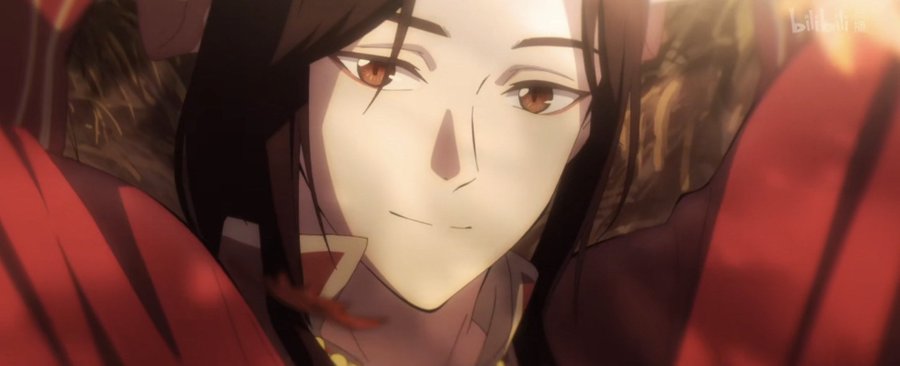
The fourth episode of Tian Guan Ci Fu is titled ‘Ghost King Hua Cheng’ and it basically killed me (in a good way).
The only part of ‘Ghost King Hua Cheng’ that I’m going to get mildly fussy about is the difference between the fan translations of Heaven Official’s Blessing that I’ve been consuming so far and the official translations they chose to go with for the donghua. I’ll refer to them as I’ve come to know them already alongside their official translations so we’re all on the same page. More often than not I’ll be using the terminology I’m used to out of habit, but I don’t want to confuse anyone. As far as which one is the most accurate? I have no idea. I do not speak Mandarin and have to rely on the good will of translators to experience the story.
Other than this small nitpick, this episode was, from beginning to end, probably my favorite so far. It’s hard to top the end of our first episode, where Hua Cheng first burst onto the scene surrounded by his silver Wraith Butterflies (or ‘Death Spirit Butterflies’), but this episode is almost as incredible as that moment if not more so.
I cried again. For real. But you’ve probably gathered by now that I’m extremely emotionally invested in this story, so that shouldn’t really surprise you.
This episode has a notably large amount of back story dumped at the beginning. After returning to Heaven, we’re introduced to the Four Calamities (or ‘Four Devils’), who are known as the most powerful and infamous ghosts in the realms. As Xie Lian has been out of the loop on Heavenly affairs for several hundred years, he has no idea who these ghosts are. Thus his little history lesson in the Communication Array (Telepathic Array) becomes our chance for some serious exposition on important ghosts in the story.
Green Ghost (Green Immor) Qi Rong
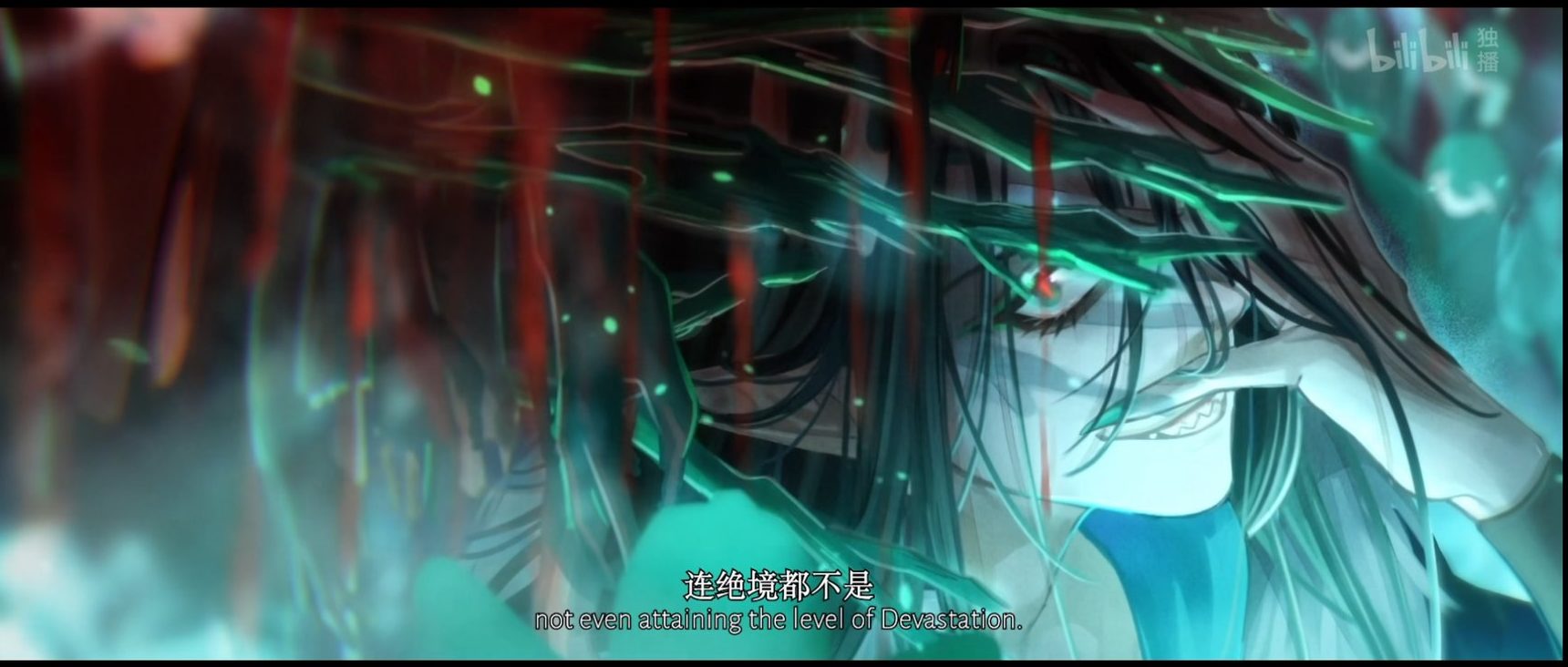
The Green Ghost (Green Immor) Qi Rong is the only one of the Four Calamities that isn’t a Devastation ranked ghost. If you recall from last weeks TGCF episode, the ranks are: Fierce (Wicked), Severe (Ferocity), Wrath, and Devastation. He’s a Wrath ghost, the same as Xuan Ji, but powerful enough to get lumped in with the three Devastation ranked ghosts. In fact, Xuan Ji is his subordinate despite the fact that they are on the same level.
Qi Rong is crude and into really gross stuff, which the Gods and even his fellow ghosts find terribly offensive. But for some inexplicable reason they made his character design for this incredibly hot and fandom is having some Struggle Tweets about the whole ordeal. He wasn’t supposed to be this attractive, but here we are.
Seriously, guys. At least a half dozen people changed their avatars to Qi Rong immediately after the episode aired. Y’all are thirsting for the Green Ghost. And I can’t really blame you. The artists have trapped us into finding this gross green weirdo attractive and we just have to live with that now.
Black Water Submerging Boats (Black Immor)
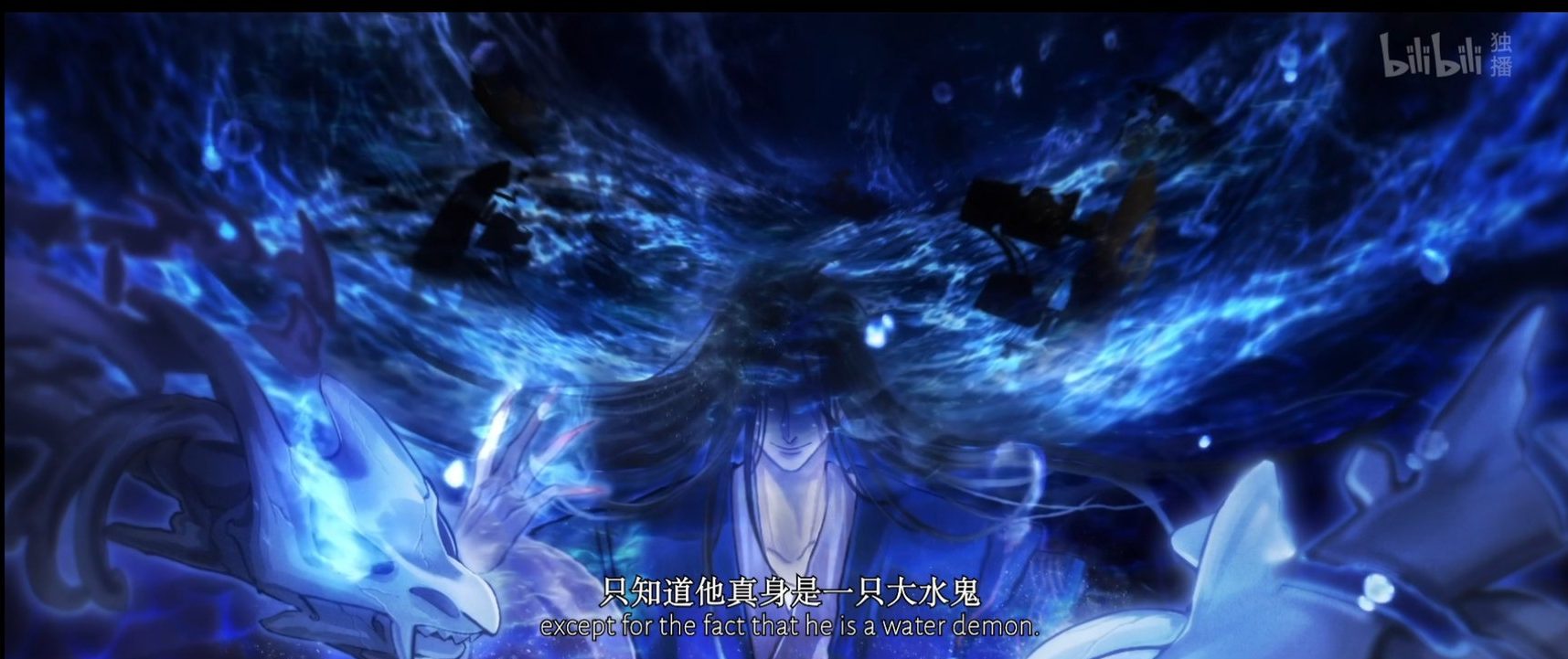
We don’t learn much about Black Water this week. We don’t even learn his real name. I was advised by a lovely reader last week that some names could be seen as spoilers, so until the show tells that to us, I’ll just keep referring to him as ‘Black Water.’ Even Heaven doesn’t seem to know much about him other than the fact that he’s a water demon and kind of keeps to himself.
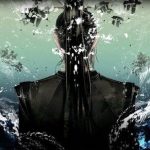
I do appreciate one major consistency between the manhua and the donghua here: they keep Black Water’s face hidden. The manhua fandom has been suffering from that decision for over a year now, so welcome to the party donghua fans! Suffer with us!
When it comes to the translation for this one, I’m not sure why they chose to call him ‘Black Immor.’ He’s not called the ‘Black Ghost’ like Qi Rong is called the ‘Green Ghost.’ He’s simply ‘Black Water’ or ‘Black Water Submerging Boats,’ or the slight variant ‘Black Water Sinking Ships.’
Also, ‘Immor’ isn’t a word, so it’s silly with Green Ghost as well. I’m not sure why they chose to make up a word for this at all.
See? I told you I’d be a little fussy about translations. I’m sorry! I’ll get over it.
White-Clothed Calamity (White Calamity), Bai Wuxiang
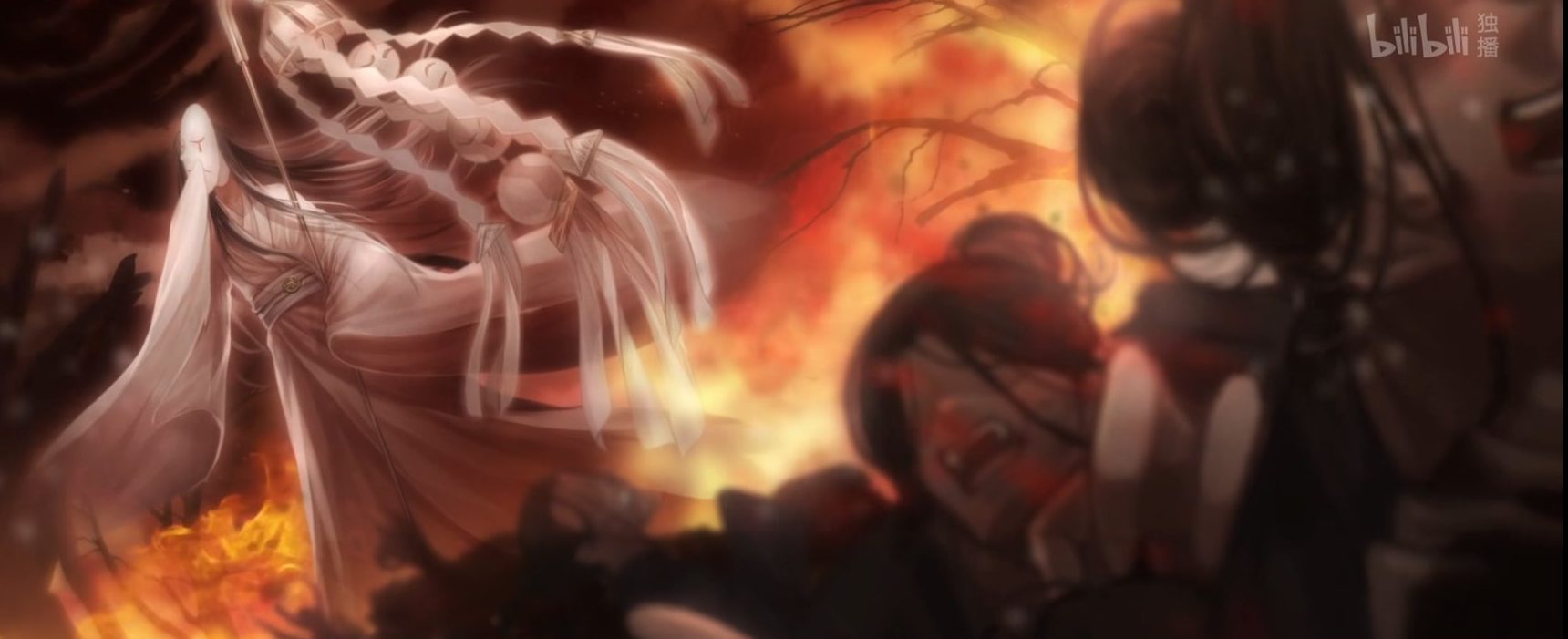
The information received during the episode about the White-Clothed Calamity is pretty sparse. We see that his real name, Bai Wuxiang, triggers some flashbacks for Xie Lian. In these flashbacks, we see the Human Face Disease (Multi-Faced Epidemic) and flames and destruction and death. It’s incredibly unpleasant.
This bit was also expanded on in exposition at the very start of the episode. The Human Face Disease hasn’t been seen since the fall of Xian Le, but the boy with the head bandages somehow had it. And then we see it here in this violent flashback related to Bai Wuxiang. I urge you to not go Googling any of this as there are many spoilers out there for it. And these spoilers are pretty big, so just sit tight (or read the book!).
Ling Wen has to step in during this explanation to assure him that Bai Wuxiang has been dead for several hundred years and that he doesn’t have to worry about it. Xie Lian handles his trigger and assures her that he’s fine, but it clearly disturbed him on a deep level. This is three times now that we’ve seen that there’s a bit of a traumatic past hidden under Dianxia’s cheerful smiles and awkwardness. We get our first look during the exposition at the end of the first episode, the second bit about the Human Face Disease at the start of this one, and now the Bai Wuxiang flashback.
Crimson Rain Sought Flower, Hua Cheng
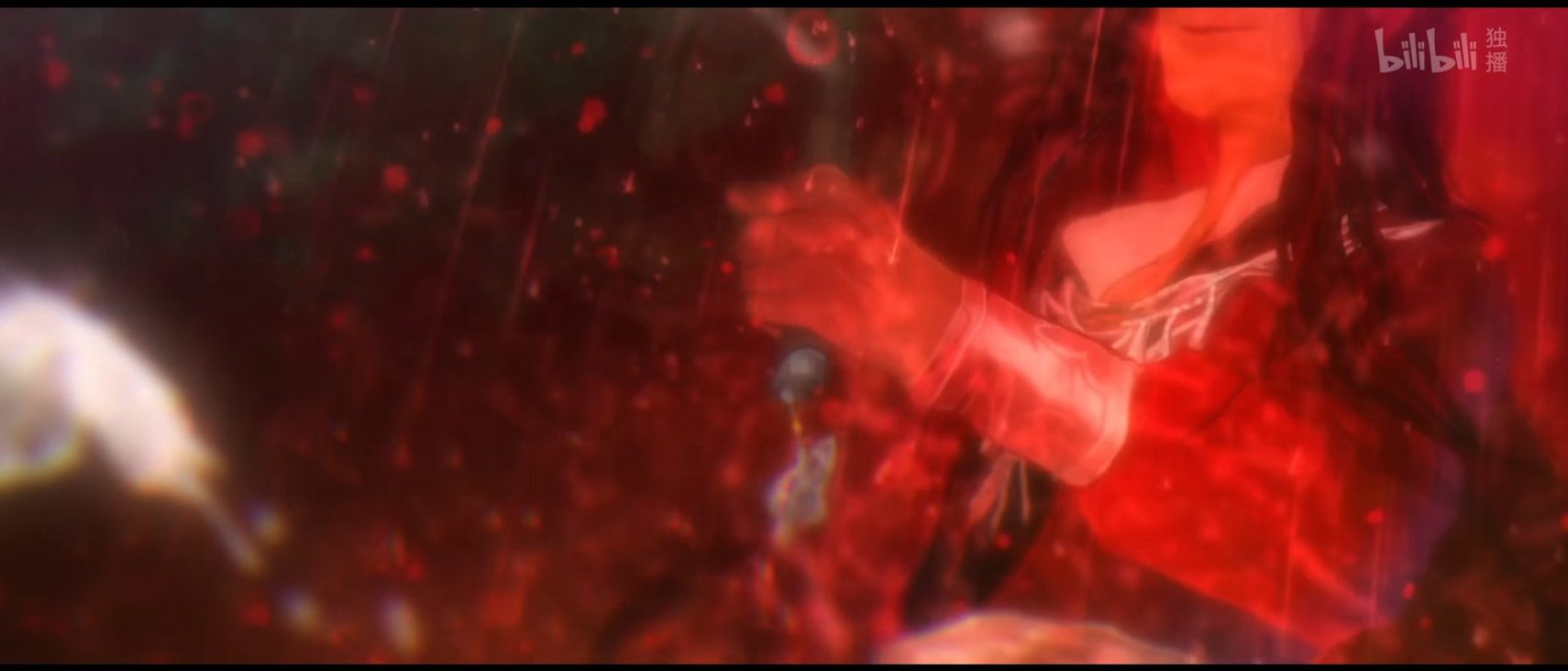
Finally we have Hua Cheng, also known as ‘Crimson Rain Sought Flower,’ who is the titular character of the episode.
An important thing to note is that ‘Hua’ means ‘flower,’ so this sound is in his name twice. His full title in Mandarin is ‘Xue Yu Tan Hua (血雨探花), Hua Cheng,’ which is just incredibly beautiful and pleasant to finally hear pronounced out loud. I’ve only seen it written thus far, okay? So it was pretty cool to hear! (Xie Lian seems to agree!)
The Heavens fear him largely due to a previous incident where he challenged 35 Gods to a duel. 33 of the gods accepted the challenge. If Crimson Rain won, the 33 Gods would descend from Heaven and become mortals. If he lost, he would leave his ashes and bones at Heaven’s mercy.
The Gods lost the bet, but refused to pay up. In retaliation, he burned down all their temples and essentially wiped them out. Worse yet, he live-streamed their downfall into their followers’ dreams and took them for his own. Temples and worshipers are the source of a God’s power, so with all their temples burned, they have no source of spiritual energy (mana) and simply cease being Gods.
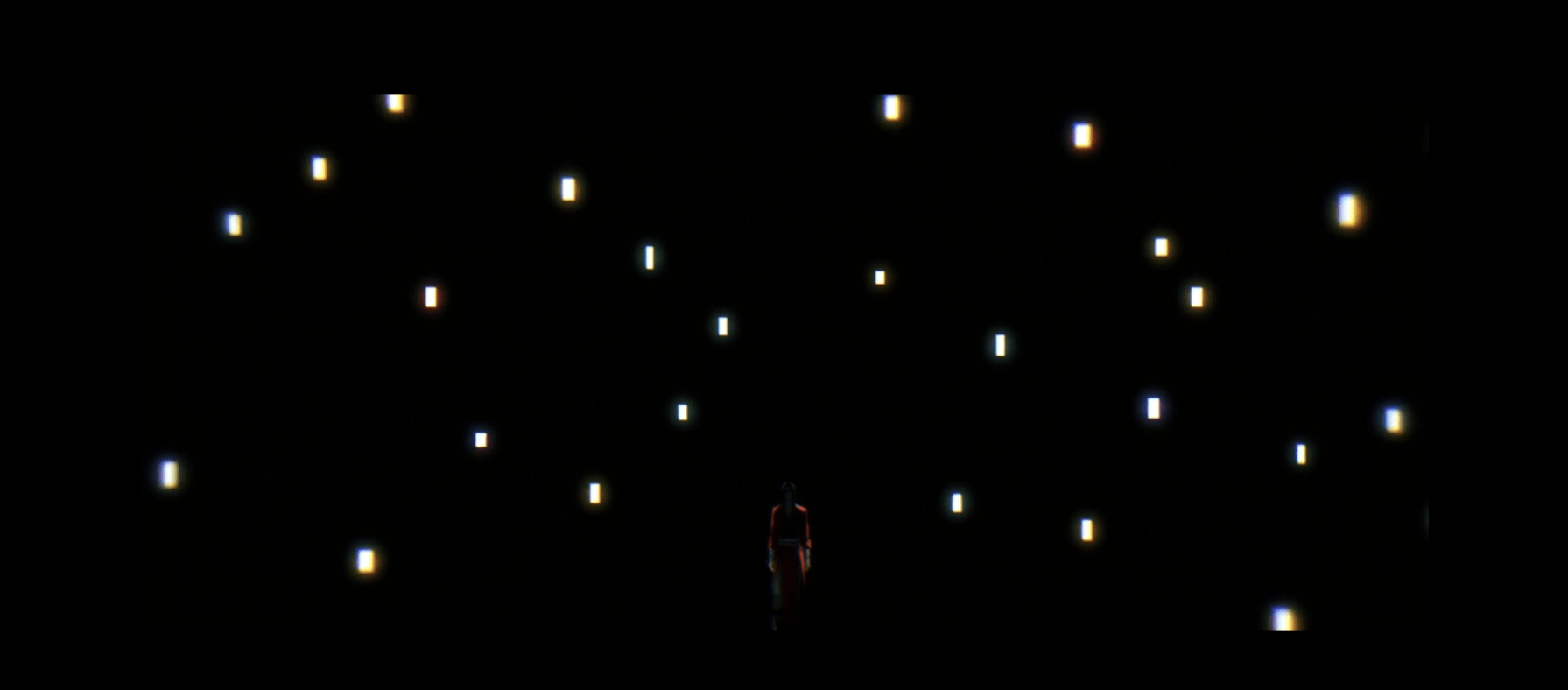
Basically, Hua Cheng is incredibly powerful and shows no mercy, but that’s not Xie Lian’s experience with him at all. All the Ghost King did during their encounter was to break Xuan Ji’s array and lead him to where she was keeping the seventeen brides. He was helpful and showed no hint of malice towards him, which is at odds to the reputation the other Gods are trying to convey to him.
The whole exchange between Xie Lian and the other Gods in the Communication Array (‘Telepathic Array’) is pretty great. It consists of the Gods warning him that Hua Cheng is dangerous, but then Xie Lian basically saying that he likes how his name sounds and that it suits him. Then they warn him about his Wraith Butterflies and he responds similarly, informing them that he finds them ‘adorable.’
He’s clearly not on the same page as the other Gods about the Ghost King, but we’ve seen that he’s really not on the same page as them on a lot of things. He’s been kicked out of Heaven twice already and he’s missed a lot.
These little scenes we got of Hua Cheng during this bit of exposition are absolutely wonderful. As I mentioned in my first review of the series, his character design is by far my favorite not just in this show, but of all time. Getting to see it in its donghua form in addition to the art in the manhua is really a treat for me. I have a huge amount of appreciation to both sets of artists for bringing such a beautiful character to life like this. While both interpretations are slightly different, the most important elements have translated over through each adaption and I actually like the variance between the two.
As a side note, I’ve seriously switched my Twitter icon between a dozen different Hua Cheng icons the past couple month, drawing from both the donghua and the manhua. Am I obsessed with this character? Maybe a little bit (maybe a lot). But 2020 has sucked, so I’m going to bask in the joy that I get from him. I love Hua Cheng so very very much. So you can imagine how thrilled I am about literally every scrap we got of him this week. I am elated.
Once this heavy exposition and explanation for the Four Calamities and all these wonderful Hua Cheng snippets wrap up, our plot continues…
After clearing up some business in Heaven, Xie Lian goes back down to earth to build himself a temple. This isn’t exactly the norm, but our Xie Lian isn’t the norm either, so you gotta do what ya gotta do. He finds an old dilapidated temple and decides he can spruce it up a bit. The building sucks, but you have to start somewhere. As previously mentioned, a God’s spiritual energy is derived from their temples and believers, so he really needs to get the word out that he exists. At this point not many people have heard of him and he needs to change that.
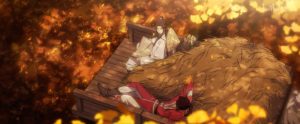 After a trip to the nearest village to pick up supplies, he meets a red-clothed youth hitching a ride on an ox cart. The youth overhears him trying to study up on all the God stuff he’d missed out on over the past few hundred years and interjects with his own thoughts on the deities. The youth is suspiciously knowledgeable about the Gods, but Xie Lian sets that aside and prods him for more information.
After a trip to the nearest village to pick up supplies, he meets a red-clothed youth hitching a ride on an ox cart. The youth overhears him trying to study up on all the God stuff he’d missed out on over the past few hundred years and interjects with his own thoughts on the deities. The youth is suspiciously knowledgeable about the Gods, but Xie Lian sets that aside and prods him for more information.
He learns of Shi Wudu, the Water God, who also has dominion over wealth. He helps Xie Lian understand how these two things connect: merchants use the water to move goods, thus over the years water and wealth became closely interlinked. It makes sense. But then the youth refers to him as the ‘Water Tyrant’ and paints a rather bleak view of the deity, showing that he’s not only knowledgeable, but opinionated.
Then Xie Lian inquires about ghosts, wondering if the youth has any information on them like he does the Gods. The youth invites him to ask more questions about ghosts if he likes, and he immediately inquires about Crimson Rain Sought Flower. Unfortunately, that’s where the episode ends and we have to wait another week to hear more. That is absolute torture.
At this point I don’t know what is and isn’t a spoiler about that youth on the ox cart. To me, they spelled things out pretty clearly with how the episode was laid out, but not everyone is tuned into how narratives are structured and might miss out on stuff that isn’t spelled out clearly. To be safe, I’m not going to elaborate too much on him right now.
To say I’m looking forward to next week’s episode would be a massive under statement. I am very much looking forward to getting the rest of this sequence and wish I had a fastforward button for life. I hope you’re enjoying the show so far and I can’t wait to experience the rest of Heaven Official’s Blessing with you guys, whether you’re a long-time fan or coming in straight for the donghua! I’d love to know your thoughts!
But before I completely wrap up this review, I’m going to leave you with this screen grab of Ling Wen, which conveys both her overworked and underappreciated status as a Civil God, as well as what I am now dubbing ‘The Official Mood of 2020.’
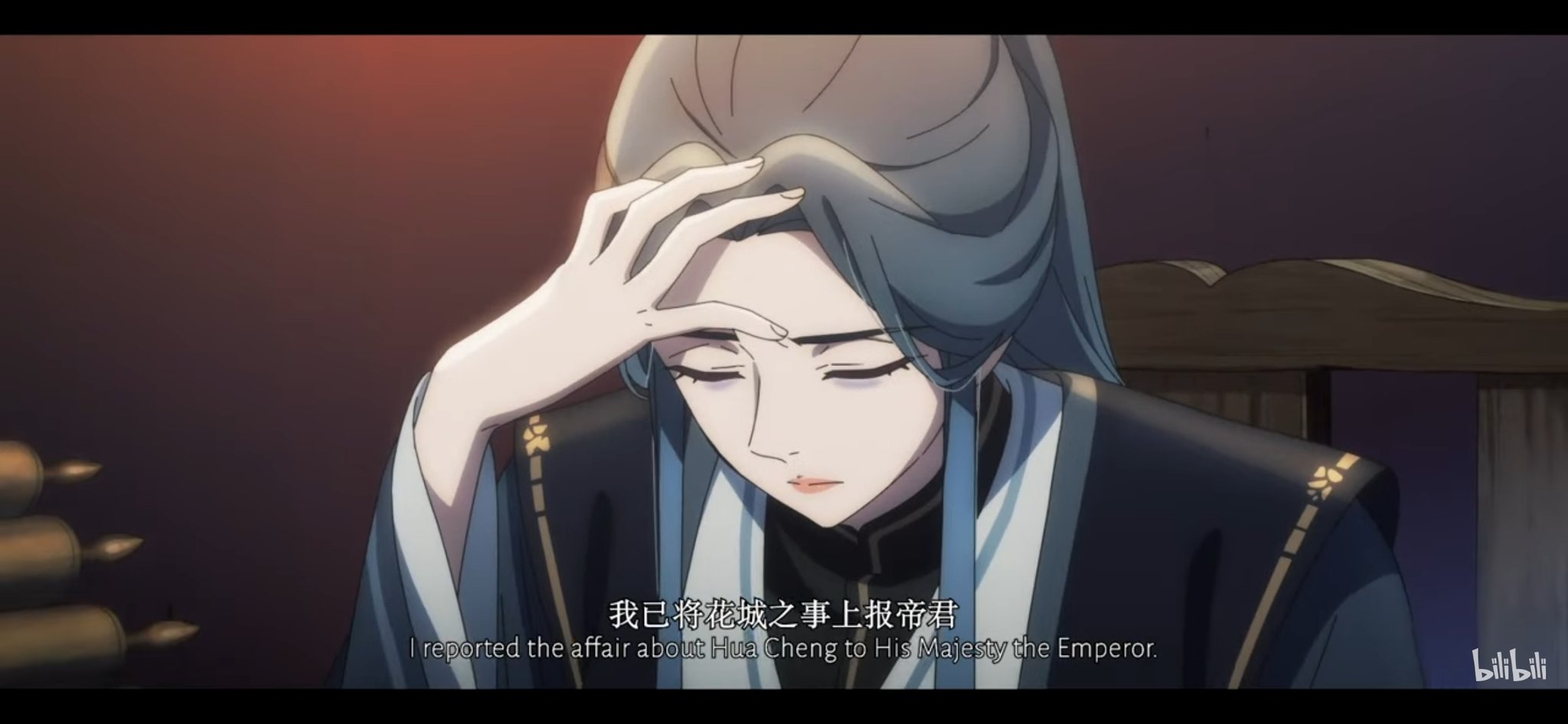
Author: Angel Wilson
Angel is the admin of The Geekiary and a geek culture commentator. They earned a BA in Film & Digital Media from UC Santa Cruz. They have contributed to various podcasts and webcasts including An Englishman in San Diego, Free to Be Radio, and Genre TV for All. They’ve also written for Friends of Comic Con and is a 2019 Hugo Award winner for contributing fanfic on AO3. They identify as queer.
Help support independent journalism. Subscribe to our Patreon.
Copyright © The Geekiary
Do not copy our content in whole to other websites. If you are reading this anywhere besides TheGeekiary.com, it has been stolen.Read our

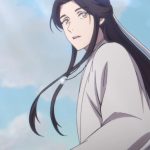

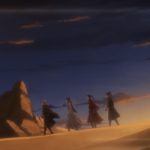

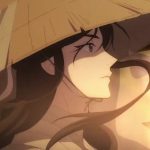
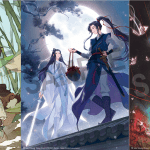
I think my favorite part of this episode was how Xie Lian doesn’t dismiss the views of this youth (I have a fairly good inkling of who this might be…) about the gods – whether it is about the tyranny of the water god or him briefly talking about the power difference between humans and the gods. Shows that even though he may never have thought it that way, Xie Lian is open to other perspectives which is quite cool – especially given that he is a god himself. I mean we’ve already seen that he is different than most gods he comes across yet it is refreshing to see that he is open to seeing flaws in a system he belongs to. Also, Ling Wen is an incredible civil god and deserves an award for putting up with the rest of the gods!! You summing up her expression as the official mood of 2020 is hilarious and spot on lol